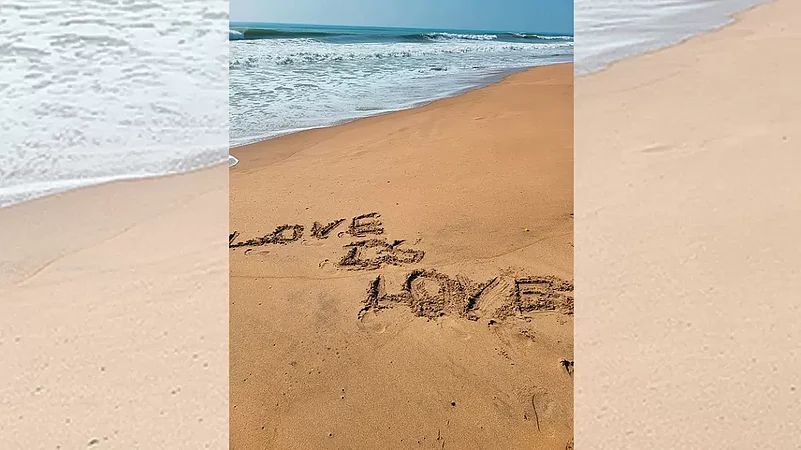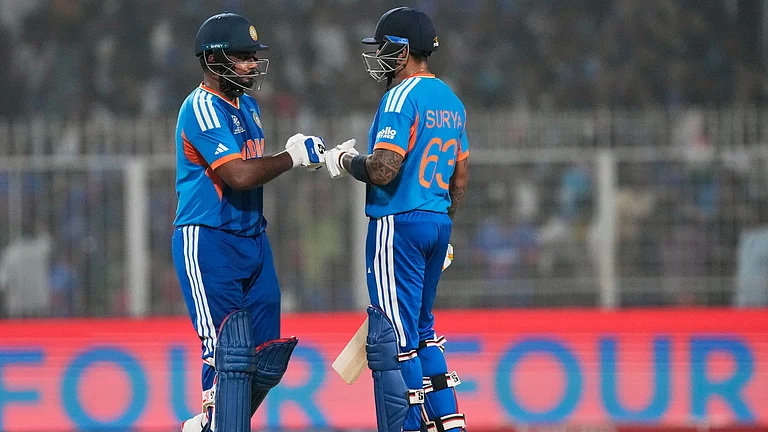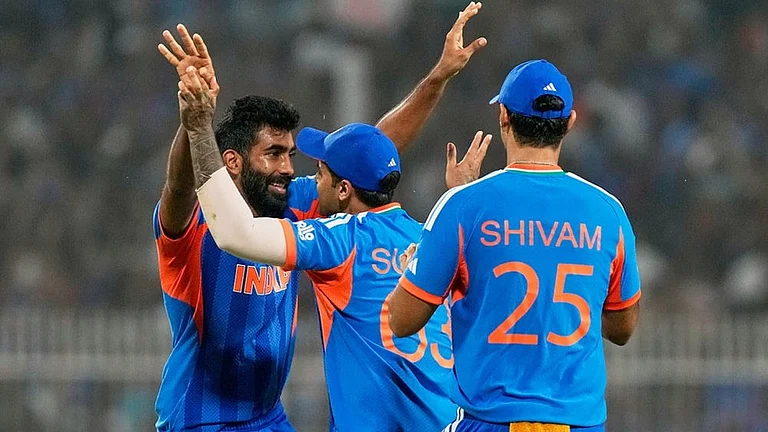That’s the question my platonic (loving but non-sexual) partner Sachin asked me while watching the new season of Indian Matchmaking. The extent to which one goes to find the ‘perfect’ person, to be forced to ‘compromise’ and adjust to 70 per cent of what one wants, to participate in big Indian weddings involving patriarchy, caste, class and problematic rituals sounds so wrong.
For the longest time, I have been against the institution of marriage. Sure, I’ve been conditioned to ‘fall in love’ with the concept of marriage. To be someone’s ‘better half’, to be ‘taken’, or to be ‘committed’. I’d root for Kareena, while at the same time feeling jealous, while she and Shahid courted each other in Jab We Met. On the contrary, I saw a meme that showed us in court fighting for our marital rights while they get a colourful wedding at the end of their love story. But recently, as there was a rerun of the same movie, when I asked a person I was dating to watch it with me, they refused and said the cinema celebrates amatonormativity and monogamy.
Amatonormativity is the belief that every human aspires to a lifelong exclusive romantic and sexual partnership with one person. The whole society is geared towards that. As if, somehow, another person completes one, every restaurant would have couple tables, even gyms would have couple discounts and so on. In fact, yesterday I got a call from a shady club that gives couples ‘free’ hotel stays, and as soon as I said my partner’s name was Sachin, the manager said, “your wife must be Srinidhi”. Casual misgendering aside, it’s not that one doesn’t get to co-regulate their emotions or share their love, finances, stress, food, and sex in marriage. They do, and this co-regulation is beautiful. But one doesn’t necessarily need to put all eggs in one basket and desire all of the above from the same person. This belief, therefore, does not essentially affirm one’s chosen family. For a lot of people, especially relationship anarchists (people who do not have a hierarchy in relationships), single folks, folks in live-in relationships and asexual/aromantic (little/low interest in sex/romance but feel love) folks, a chosen sibling, parent, or a friend could be as close to them as their romantic partners, and would thus like to have all the rights that a romantic partner gets, to be held by the chosen family as well. Also, for someone who is polyamorous (interested in maintaining multiple consensual relationships simultaneously), marrying one person does not make sense, and creates a hierarchy. Not to forget, marriage is one of the oldest institutions of control, especially of marginalised genders, sexualities and castes.
Having closely seen the struggle of people married in childhood, of the discrimination faced by widows at weddings, and of course, the exclusionary religious and casteist rituals at weddings, weddings have felt like anything but a celebration of love. But the Special Marriage Act? That sounds about right in giving rights. But which rights? Of inheritance? Of shared wealth? I remember a friend saying marriage is a tool to propagate the hoarding of wealth. Right to raise children? That sounds like a fair right. I know gay couples interested in adopting children with HIV. Right to hospital visitation? Of course.
Ideally, these rights should be of all of one’s chosen family because many of these are rights that one already gets with their biological family. One needn’t have to ‘marry’ for these. Many queer (LGBTQIAP+) people, especially trans people, do not find acceptance in biological families and build lifelong chosen families with whom they share a closer bond than even romantic partners who, more often than not, drift away. Quoting the Twitter user Super Deluxe (@sachp), “The end goal should be to recognise diverse forms of families instead of squeezing diverse families into a heteronormative structure”.
I distinctly remember another tweet when homosexuality was decriminalised that said the next project for privileged caste and class queer folks would be to legalise queer marriage. We would one day see kundali-matched, similar height; skin tone-matched, wealth-sharing gay weddings in exotic locations. One could, of course, bring up Harihara, Ardhanarishwara, or scores of homoerotic or trans traditions to justify the religiosity of it too. But what about the reality that marriage in India is predominantly an institution of oppression? Where marital rape is still not illegal, or dowry shows up in various forms. Also, what about the process of divorce not being accessible or taboo?
On the other hand, will acceptance of queerness increase with legalisation? I remember when I came out to my mother: one of the first things she said was, “It’s now become legal too.” She also said that if I went against it, I’d be going against God’s creations as well.
There’s a theory that most older queer folks don’t exist because most of their generation died young for various reasons. The presence of a queer uncle who’s happily married with kids and the possibility of one legally marrying one day can normalise acceptance gradually. But there’s the argument that legalisation did not necessarily help the West accept queer rights fully, as is evident with the hundreds of queerphobic laws Western countries (especially the US and the UK) seem to be passing, or the hate crimes they witness, despite a decade of legalisation of gay marriage. There’s also the argument that asks for the “right to choose”, which says that queer folks should have the same rights as heterosexual folks, irrespective of their choice of marrying.
That is because it gives the power to dream and not reaffirm the status quo of nightmares. Last night, as I wrote a part of this piece and slept, I had a nightmare in which I was forcibly married to this woman who I did not have any feelings for. It was so hard to hold a conversation, even to walk, to pretend to feel love holding hands and get freaked out with the touch. Remember the butterflies that Kareena felt? The celebration that was ‘Nagada’? Queer dreams are not made of such stuff. They are nightmares, more often than not. It was not a nightmare just for me but also for the woman with me. Legalising queer weddings could potentially reduce such marriages and nightmares while planting more pleasant dreams.
Or perhaps not. There was another meme that went viral. While privileged queer folk get to pursue their dream of marriage in courts, trans activists were on the streets of Chennai being detained, asking for horizontal reservation (like how cis-gendered women get reservation currently and reservation within existing SC/ST/OBC/GM reservations) for transgender folks from those backgrounds, something that has been a long-standing demand. For a set of people to whom sex work or begging has been the mainstay for millennia, this can be life-affirming and a step towards healing generations of oppression. Trans-folks from oppressed backgrounds have been at the forefront of the liberation of queer people. There’s also the oft-repeated quote: “There’s no queer liberation without trans and Dalit liberation.” But when fighting for these rights, Grace Banu and her peers were detained on Chennai’s streets. The courts don’t hear them with the same urgency with which the hearings on queer marriage are being listened to. Most privileged queer folk who show up for Pride marches and parties don’t show up for trans rights marches or Trans Remembrance days. Hardly is there any discourse for intersex folks while sex as a binary is perpetuated along with the gender binary. Even within Pride, there is a precise segmentation of indigenous trans communities on one end with their slogans and the “Pride is party” crowd on another end with their selfies and post-Pride party plans in the making. I’ve even heard of the term ‘protest dating’ by privileged Twitterati. Also, the focus on pushing for anti-discriminatory laws, anti-bullying laws, and anti-extortion laws for Trans folks is missing. How does one even speak of taking all this discourse and events beyond capitalistic cities? I still remember, after the very first Pride in Mysuru, having sloganeered (“Namma Deha, Namma Hakku,” meaning ‘my body, my rights’) for equal rights with trans folk from various indigenous communities, and then meeting some of the same folk at the traffic signal. At the same time, I sat in our car, reminded of my immense class caste and intellectual privilege.
However, several petitioners who have petitioned for queer marriage are from marginalised trans communities. Several other petitioners come from small towns or poor backgrounds. I know many people from marginalised backgrounds who also would love to see queer marriages happen and rights be given. And that this is one step towards more liberation is perhaps not untrue. At a time when we see hundreds of laws that are queerphobic being passed or discussed daily, including the proposed heartbreaking law in Uganda that gives the death penalty to queer people, that, despite all its flaws, India can debate and test the case of pro-queer rights is a tribute to Dr BR Ambedkar and his systems, including the fact that he once represented a homosexual man in a court case.
So personally, as confused as I am about all the merits and demerits of the case, I know that the legalisation of queer marriage could be affirming to many people. While holding space for a horizontal reservation bill or anti-discriminatory laws, perhaps we could welcome a well-considered legalisation of queer marriage with rights, while also pushing for expanding the scope of legalisation to chosen families (there are pockets in the US debating this and was brought up in the Indian case hearing too), live-in and polyamorous relationships. Also, as a bi+ person (someone interested in more than one gender), one of the more common reasons for biphobia is that I’d marry a woman. If I could also marry a boy or a non-binary person legally, this stigma would lessen. Even for gay people who marry women, being able to marry men could be a way out of family pressure. I’ve seen how decriminalisation and the prevalence of gay dating apps have changed lives in tier-2 and tier-3 towns. One of the guys I met in one such beach town held my hands while his family was around and, on the sand, wrote “Love is love” while clicking pictures as a couple with the camera person by the beach who usually shoots heterosexual couples on honeymoon.
I’m that romantic to be doing that with someone on my first date. It’s perhaps also because, for most queer people, there is usually no second date. I saw this meme on Instagram that says, “Healed your inner child? Wait for your inner teenager to come out”. For many of us, post-2018 has been a second teenage, the 30s being our new 20s and so on. Most queer people have been single despite wanting to be in romantic relationships. If it is hard to find love for cis heteronormative people; it’s harder for queer folks. A guy I once asked out, while turning me down, said, “Look, it’s not on you. Most of us are avoidant, traumatised, stigmatised, and do not have many role models to base our relationships on.” Will legalisation mean it will get easier to find love? Maybe. Or will it push all of us to get married and ‘settle’ the way my heterosexual friends suddenly found true love and married like lemmings before turning 30? It’s one thing to be born once, graduate once, and get placed once, but married once? The whole marriage deal is like the movie Everything Everywhere All at Once—a complete neurodivergent queer roller coaster.
But one thing is for sure. We have become dinner table conversation. Even the grammar app I’m using is more gender-affirming. The options it’s suggesting includes “they” along with “he” and “she”. For a society that uses “they” for all genders already as a mark of respect and has been exposed to homoerotic and trans traditions, it only means we now need to be more accepting. We have come quite far from potential life sentences to the proliferation of gay dating apps nationwide, hosting drag shows, asking for reservation and marriage rights and letting queer people adopt children who were abandoned by heterosexual couples. Even cis heterosexual men love holding hands or cuddling by the road here. So it must not be that hard to see gay couples hold hands and be together?
I attended a concert last week deep inside a step well, and the prompt was to look at it like entering the womb of the earth, the mother’s womb. The singer sang songs of Kabir that spoke of how these well-like pots come in all sizes and shapes (like queer people do), but they all hold the same water (life). As I sat deep inside a restored well that’s hundreds of years old after binge-watching the day’s hearing, I reflected on the history of the well. One of my friends, from a trans and indigenous background, would regularly come for her workshops there as it held a trans children’s shelter home. She would go deep into the well by the stairs. As the concert ended and the singer asked to place wishes inside the well, I wished for her and a lot of other queer people to get what they wanted at the hearing. One of the diggers of the well had sung a song while restoring it about how even the most barren of wells will one day fill and sprout plants. And 20 years ago, it had rained that day, filling the barren well with three feet of water. On my way back in the hot summer, after wishing at the step well, it started to rain, and the next day my trans colleague told me that her partner’s family had agreed to the marriage.
Legalisation? Let’s wait and watch.
(Views expressed are personal)
Srinidhi Prahlad is a museum curator, archivist and co-founder of a tech start-up























